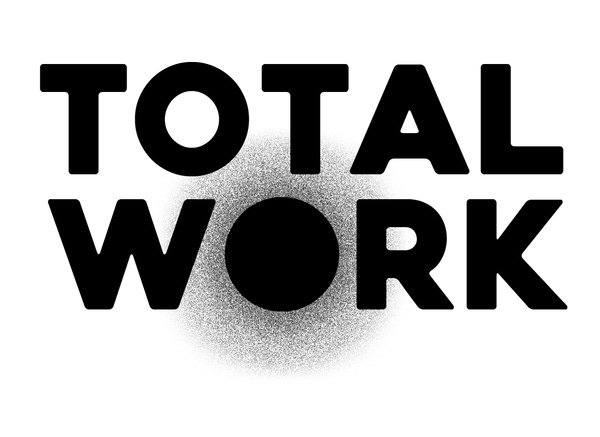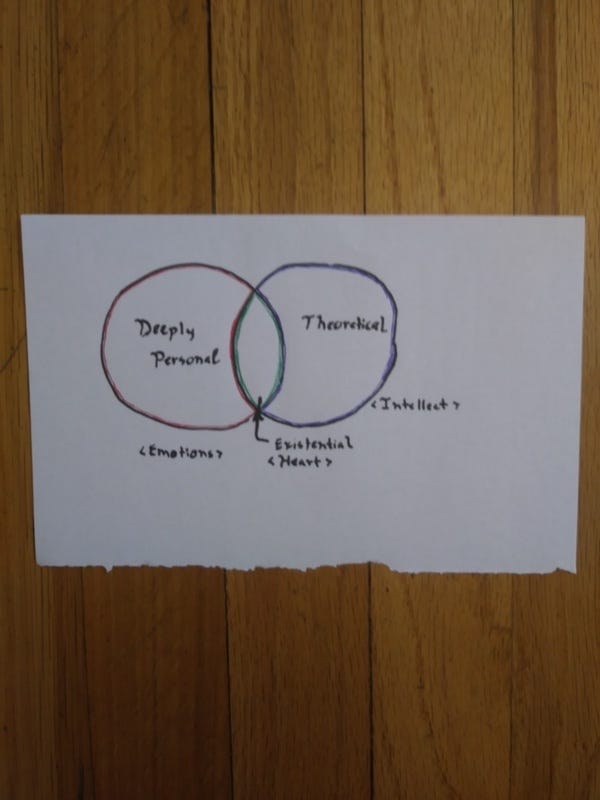Total Work Newsletter #20: The Existential

Total Work, a term coined by the philosopher Josef Pieper, is the process by which human beings are transformed into workers as work, like a total solar eclipse symbolized in the logo above, comes to obscure all other aspects of life. In these newsletters, I document, reflect upon, and seek to understand this world historical process, one that started at least as far back as 1800 and possibly as early as 1500.
Announcements: When you receive this issue, I’ll already be in Denmark, probably on a train headed for Aarhus. As I wrote last week, expect to receive issues willy nilly over the next 2-3 weeks.
An Urge to Work
Gustav Mahler (HT Peter Limberg) once said,
You know that all I desire and demand of life is to feel an urge to work!
I suspect he’s thinking of work as artistic creation and not as travails. Still, this seems a rather blinkered view of a human being’s desires and demands out of life.
Fertility Rates, the Sabbath, the 9.9%, and More
#1: WORK AND BIRTH | U.S. Fertility Rate Fell to a Record Low, for a Second Straight Year | 5 min. | NYT | News HT Michael Coren
NYT Sum: The country has been living through one of the longest declines in fertility in decades and demographers are trying to figure out what is driving it.
Unacknowledged Factor: I think one unacknowledged factor in this decline in fertility is total work and, most especially, total work’s manifestation in careerism. I’m arguing in my next Quartz at Work piece that the career is a very bad idea.
#2: SABBATH | Remember the Sabbath? | 3 min. | The Guardian | Opinion HT Pete Sims
Guardian Sum: Douglas Rushkoff pleads for a respite from e-commerce
My Take: This piece was written 18 years ago, in 2000. It sounds like “the technological society” already so presciently described by Jacques Ellul in the 1950s. The good thing is that Rushkoff tries to make room for the Sabbath. The bad thing is that it doesn’t go nearly as far as Albert Heschel’s wonderful little book The Sabbath (HT Michael Coren). The Sabbath is about more than merely taking a day off or “some time off.” It’s a day of rest around which the rest of the week is anchored.
#3: INEQUALITY | The Birth of the New American Aristocracy | 45 min. | Atlantic | Long Form Essay
Atlantic Sum: “The class divide is already toxic, and is fast becoming unbridgeable. You’re probably part of the problem.”
Brief Overview: Super-long piece by Matthew Stewart, who has lived a pretty interesting life first as an academically-trained philosopher and later as a management consultant skeptical of management consulting. In this piece, he argues that it’s not the 0.1% that we should target; it’s the 9.9%–what I might call the “knowledge worker class”–that needs to take account of the role its played in increasing economic inequality. The blood, in short, is on our hands.
#4: HIJACKED | McMindfulness: Buddhism as Sold to You by Neoliberals | 5 min. | Conversation | Essay
Conversation Sum: “It is no accident that practices of meditation and mindfulness have become so ubiquitous in our neoliberal times.”
Distinction: The author ultimately distinguishes between a good form of mindfulness (of the sort that Buddhists practice) and a bad form of mindfulness being hijacked by neoliberals.
#5: WELFARE CONDITIONALITY | Benefit Sanctions Found to be Ineffective and Damaging | Society | 5 min. | Guardian | News HT Christopher Brewster
Guardian Sum: “Study concludes that punishing claimants triggers profoundly negative outcomes.”
Brief Take: The author discusses the conditional nature of welfare payments, arguing that benefit sanctions are both immoral and ineffective. My friend Christopher Brewster wrote to me, saying that these sorts of pieces are “[m]issing from your thoughts on total work, I feel.” I’ve yet to shine a light on “[t]he way the welfare state in Europe has become an enforcer of total work even when there are no jobs available.”
#6: DRINKING | Letter of Recommendation: Drinking at Lunch | 5 min. | NYT | 1st Person HT Eliza Brooke
NYT Sum: A pleasant protest against the tyranny of workplace productivity.
Reclaiming Pleasure? The author writes: “What I enjoyed most, though, was not the light buzz of two glasses of wine, but rather the sense that I was reclaiming, if only for an hour, a proportional sense of pleasure in my life. It felt good to do something mildly hedonistic in the midst of an otherwise relentless workday. After all, the mindless pursuit of productivity can result in a swallowing sense of existential pointlessness, and as we’ve all learned from history, that will only drive you to drink.”
The Existential
Something Happens, is Happening, is about to Happen
We have a deep misconception of philosophy, and here I can only scratch at clearing some of that confusion up. We think that philosophy is an overly theoretical activity undertaken exclusively by a set of trained experts operating in the modern university. In truth, philosophy is the activity concerned with our asking and seeking to answer the most basic questions of human existence and with our making our lives into the best answers we’ve come to so far.
The most important word in that provisional definition is existence.
Having philosophized with people around the world for a number of years, I’ve begun to notice that I come into others’ lives either just after something happened or just before something happens or both. I’m keeping this “something happening” purposefully vague. A crack has been revealed, a fissure, or something much greater. A life turns in one direction, then another. A mother dies. Friends are heading to the wedding. Leaves rustle, and the feeling of death causes me, just now, to tremble. A career ends. A man takes mushrooms in the forest, and a vision is revealed to him. A woman stops taking an antidepressant after two decades, takes a hard look around, and realizes that she no longer loves her husband. Conviction is lost and a man is sent wandering.
In brief, some ending perhaps, some beginning (too) perhaps, some wonderment no doubt, a world less certain and our place in it much shakier.
I want to call the domain of philosophy “the existential” (see the hazy diagram below).

Because Who Doesn't Love a Good, if Slightly Blurry, Venn Diagram?
Getting angry because someone cut you off in traffic is “deeply personal.” Your emotional reaction comes fast and you inhabit that anger, feeling as if you’re all inside of it. Indeed, your world, so to say, is angry, colored all around by anger. By contrast, studying string theory is “theoretical.” Your intellect is seeking to devise and understand a model of the universe.
Now, something can be said to be “existential” or “of existential weight or importance” if it–somehow and perhaps rather mysteriously–combines something deeply personal (“I have a personal stake in it; I care so much about this; I’m gripped or torn or tossed by it”) and the theoretical (“This matter is bigger than me, goes beyond me even”). This, I think, is the tender, sweet spot: something has touched me to the quick, and that something also transcends me.
When it comes to the existential, I feel implicated. It is not merely that I’m thinking about death in some merely theoretical way. No, I’m all caught up in thoughts of death: I fear it, I loathe it, I’m trembling because of it, I’m moved by it, I’m touched by how close the shadow of death is to me even now.
I’ve felt this myself.
Notice what happens, though, when we lose our intellectual curiosity. Then the world becomes dull to us and we can only retreat to the realm of our private emotions. We should be wary of anti-intellectuals. But then notice what happens when one fails to be attentive to the perturbations of one’s spirit. Does not one become dried out, stiff, and frumpily eggheaded?
The existential–to put it another way–when the world and the self meet and merge.
Some Cases for us to Consider
When we philosophize, we seek to place our fingers, and our hearts, on something of existential weight, whatever it turns out to be. That is to say, philosophy is an invitation to inquire into the entwinement of the finite and the infinite.
Take three cases: time, self, and work. Theoretical physicist Carlo Rovelli misses something, I think, when he argues that time is an illusion. That may be true at a theoretical level (and so far as that goes, it’s fine), yet it fails to approach our hearts on the existential level. Brian Magee, in his autobiography Confessions of a Philosopher, relates that he woke up to philosophy when, as a child lying in bed at night, he was overcome by the question of what time was. Take a second look at the scene: Magee can’t fall asleep because he’s all taken up by the question of time. Rovelli’s views may be right, yet Magee’s starting point is where it’s at; is where Life is at.
Now self. You can perhaps be curious about the proposal that the self is an illusion, yet that matters not a whit if, from a Zen Buddhist point of view, you’ve yet to see for yourself that no such self exists. To see that directly for yourself is to be in the midst of “the existential.”
Now work. The main reason I’m writing about total work is that it’s a matter of existential importance. To question work is to question:
At a first level: What is this task? What am I doing?
At a second level: Why am I doing this?
At a third level: What in the world am I doing at this organization?
At a fourth level: Geez, what am I doing with my life?
At a fifth level: What is my life really, fundamentally about?
And so on.
David Graeber’s refreshing argument against bullshit jobs–the view according to which some jobs have no social benefit and those jobholders have to pretend that they do–is indeed a matter of existential importance, yet it doesn’t go far enough. We have yet to ask why we think that wedding our lives to matters of mere social benefit is what matters to the degree that we believe it is.
The truth is that it doesn’t.
Further Reading
In early March 2017, I wrote this poetic piece, “My Heart Dwells in Silence,” in order to understand what was happening during certain philosophical conversations. It’s this piece that forms the basis of what I’ve written above in more straightforward prose. It’s poignant where the above is sober.
- - - - -
Comments, Suggestions, Articles on Total Work?
Feel free to send comments, suggestions, thoughts, and articles about total work to me at Andrew Taggart <totalwork.us@gmail.com>.
If You’d Like to Become a Patron…
Thank you to my new patron, Francis! If you feel called to support my philosophical life, you can do so here <https://www.patreon.com/ajt>.
For Newcomers
Looking for some clarity about the nature and history of total work? Start by reading my brief overview of total work on my Patreon account <https://www.patreon.com/ajt>, Next, take a look at the first issue of this newsletter <https://www.getrevue.co/profile/andrewjtaggart/issues/total-work-newsletter-1-working-ourselves-into-a-frenzy-89819.> Next, check out my Quartz at Work pieces (December 2017- present), which are available here <https://work.qz.com/author/andrew-taggart>. Lastly, visit my website, totalwork.us <https://totalwork.us>, which is devoted to investigating this topic and which is also still under construction.


